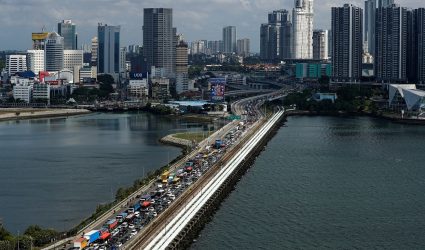Opened border brings sweet relief for Singapore businesses as more Malaysians return to work

(Straits Times) – Hundreds of Malaysians – from factory workers to salesmen, electricians, painters and carpenters – have crossed the Causeway to Singapore for work since last Monday.
The inflow has come as a relief for many businesses which lost their key staff when the border was closed on March 18.
Renovation firms were one of the hardest hit as about 80 per cent of their skilled workforce is from Malaysia.
Some companies in the sector have had to shut for good, said Sky Tan, president of the Singapore Renovation Contractors and Material Suppliers Association.
He cited cash flow issues as one of the reasons for the closures.
Most Malaysians in the renovation trade commute daily to Singapore, he added.
When the Malaysian government closed the border in March after it saw a surge in Covid-19 cases, many of those workers were stuck at home while others sought temporary accommodation in Singapore so they could continue working.
But when Singapore went into partial lockdown and circuit breaker measures kicked in on April 7, more Malaysian workers returned home.
“Hence, when Singapore started reopening the economy in May, we couldn’t start work as many of our workers were stuck in Malaysia,” said Alloyious Koh, chief creative consultant of Carpenters Design Group.
The staff shortage led to higher renovation costs and delays in completing projects and collecting payments. Some bigger firms have had to downsize operations while others had to shut for good.
Koh said his company has brought in around 20 workers under the Periodic Commuting Arrangement (PCA) scheme and they are now serving a seven-day, stay-home notice. Once they return to work – hopefully next week – he is optimistic about getting operations back to normal.
Limited cross-border travel between Singapore and Malaysia under two schemes – the PCA and the Reciprocal Green Lane (RGL) – began last Monday.
The RGL facilitates short-term travel for essential business or official purposes between both sides for up to 14 days, while the PCA allows Singapore and Malaysia residents with long-term immigration passes for business and work in the other country to enter for work.
People who enter under the PCA scheme must stay in the country they work in for at least 90 days before they can return on home leave.
Singaporeans and Singapore permanent residents do not need the PCA to return to Singapore. However, they still need to serve stay-home notices that will be reduced from 14 to seven days from Sept 1.
Last week, Malaysian media reported that the Malaysia authorities allow a daily quota of 400 travellers under RGL and 2,000 under PCA schemes. These quotas were reached in the first three days of the border reopening.
A Ministry of Trade and Industry spokesman told The Sunday Times that the application for cross-border travel made through Johor Immigration Department is meant for travel from Singapore to Malaysia, and differs from the applications made via the Safe Travel Portal for travel from Malaysia to Singapore.
Malaysian Association in Singapore president Aarathi Arumugam finds the cost of travel under the PCA scheme too high and unaffordable for people on lower incomes.
The uncertainty and risk are too high for them to undertake, she added, noting that if they return to Malaysia (for home leave) and get infected with Covid-19, they might end up losing their jobs here.
In pre-Covid-19 days, more than 100,000 Malaysians crossed the border daily to Singapore to work in a wide variety of jobs – chefs, hairdressers, security officers, construction supervisors and professionals – before returning home at night.
They were among the 300,000 or so people who used the Causeway daily at that time.
“The resumption of cross-border travel is, however, still a trickle compared to… before the pandemic,” said Maybank Kim Eng senior economist Chua Hak Bin.
But despite the limited access, reopening the border “will help reduce some of the worker shortages faced by contractors, especially for home renovations and repairs”, Chua added.
American biotechnology firm Illumina, which had several hundreds of Malaysian employees commuting here daily before the pandemic, was faced with the challenge of operating with far fewer staff when Malaysia closed its border.
Illumina stayed operational during the circuit breaker and continued to supply products to customers who needed them to combat Covid-19-related activity, a spokesman told The Sunday Times.
The company has since successfully applied for over 100 Malaysians to return to work here. It is also paying for the accommodation and transport of over 200 Malaysians working here.
Electronics giant Gain City, which had 20 staff stuck in Malaysia, brought 10 back under the PCA scheme.
Felicia Ng, senior manager of special projects, said the firm has paid about $10,000 for hotel accommodation, meals and swab tests for the 10 staff, who are serving the seven-day, stay-home notices.
If the test results come back negative, these workers will stay with friends and relatives and start work this week, said Ms Ng.
Malaysian Foo Tuck Hoe, 33, who returned to Singapore last Monday, said the border reopening has brought much hope to him and his family. Foo, an aircon installer at Gain City, said he had been worried about not having a stable income after he found out in May that his wife was pregnant.
“I was so happy when the doctor told me my wife was pregnant. I have been yearning for a child. But two days later, I started to worry,” he said in Mandarin.
Foo, who used to commute daily to Singapore, is grateful to his employer for paying for his trip back: “The cost is unaffordable to me. It’s equivalent to six months of my living expenses in Johor.”

